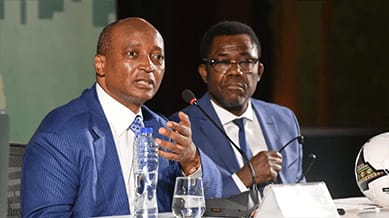The Confederation of African Football will be debt free next year as a result of improved governance since Patrice Motsepe became president in 2021.
Installed as deputy just days after the South African billionaire was appointed president, Mosengo-Omba says Caf’s level of debt when the pair took over was about $40m (£31m).
He says this figure has more than halved since, with the tally set to drop even further when Caf’s financial accounts are presented later this year.
“I think we will present a [deficit] figure to the Caf congress of less than $12m (£9.3m),” Mosengo-Omba said.
“For the next fiscal year, [the debt] will be zero.”
The Caf financial year runs from the start of July to the end of June, with accounts traditionally presented to congress in October, meaning the organisation could be debt-free in just under 12 months’ time.
Mosengo-Omba, who hails from DR Congo but who also holds Swiss nationality, says that credit for the turnaround must go to his 62-year-old boss.
“Motsepe and his executive coming in was, for me, a gift for African football,” said the lawyer, who worked as Fifa’s chief member associations officer before joining Cairo-based Caf.
“In 2021, Caf was a toxic company – nobody trusted Caf. When Motsepe came, he put the principle of good governance and integrity in all levels of the organisation.
“This brings confidence to our partners.”
One of Africa’s richest men, with a fortune estimated at $3.1bn, external (£2.4b) by Forbes, Motsepe replaced the previous administration led by Madagascar’s Ahmad.
Elected president in 2017 when he dethroned long-standing Caf president Issa Hayatou, Ahmad’s tenure was blighted by scandal, with the Malagasy – who denies wrongdoing – banned for two years by Fifa for breaking its ethics codes, including ‘misappropriation of funds’.
The Hayatou administration maintains that it left over $100m (£77.4m) in reserves when it departed, with the funds declining vastly under Ahmad, whose regime increased salaries, cut Caf’s biggest-ever broadcast deal before then suffering some Covid-enforced losses.
Under Motsepe meanwhile, the number of sponsors of Caf’s flagship Africa Cup of Nations (Afcon) competition has risen from 10 for the 2021 finals in Cameroon to 17 for the 2023 edition, which was played in January this year.
It also gained a global television audience of 1.1 billion, with double that tally – 2.2 billion – accessing the tournament’s digital content.
“In Cameroon we generated about $4-5 million (£3-4m) profit. In Ivory Coast the profit was more than $75 million (£58m). This shows we are [going] in a good direction and for Morocco, the next edition, I think [the profit] will be increased by 50%,” said Mosengo-Omba.
Most of this increase is coming from sponsors and television rights, with the secretary general also declaring himself “very happy” that Caf generated $14m (£10.8m) after taking ticketing and hospitality in-house for the first time.
Despite recent comments by Afcon-winning Ivory Coast coach Emerse Fae, Mosengo-Omba dispelled suggestions that the tournament could become a four-yearly affair by reiterating the fact that the governing body’s greatest income comes every two years from the finals, which next kick off in December 2025.
“The periodicity of Afcon is not on the table,” he said. “We need the money from Afcon every two years to run football in Africa.”
Mosengo-Omba also sought to strongly defend Caf’s approach to dealing with allegations of corruption against some of its senior administrators, insisting it is “not protecting crooks”.
Malian federation president Mamatou Toure is currently on trial for embezzling public funds in the West African country, while counterpart Wadie Jary is facing corruption charges in Tunisia.
Both men, who have denied the charges after their detentions last year, remain both in prison and members of Caf’s executive committee.
Pressed on why neither has been suspended, Mosengo-Omba said the organisation could only take action once court cases are settled in their respective countries.
“We suspend [people] provisionally if we are investigating the case ourselves,” he added.
“We respect the sovereignty of each country. When we have the verdict of the court, we’ll take a decision. Nobody is above the law in Caf – no-one.”
In May, Toure – a member of the Fifa council – reportedly dialled into a Fifa meeting from his prison cell in the Malian capital Bamako.
“If Messrs Toure and Jary committed crime according to the respective regulations of each country, take them to court,” the Swiss-Congolese said.
“How can Caf intervene in the situation?











